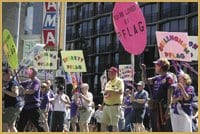The on-again, off-again Seattle Pride parade is on again despite the financial woes of its host, Seattle Out and Proud (SOaP), which is still trying to pay off last year’s debt topping $100,000 incurred when it moved the event downtown.
As recently as a month ago, SOaP issued a press statement saying the “best thing for the community is for [the organization] to dissolve and allow someone else to step in and take over Seattle Pride.”
Simply put, the Apr 23 release said, the income from last year’s Pride march and festival was not enough to cover their costs.
But two days later, SOaP sent out another statement saying it would go ahead with the parade “due to overwhelming support.” The festival, however, was not “financially feasible.”
Then on May 4, SOaP and the Seattle LGBT Community Center issued a joint release saying they were going to “co-promote a large-scale citywide Pride weekend.”
Now two festivals are apparently in the works, one organized by the Center and another by a private promoter.
“The SOaP people announced one day they were going to file bankruptcy, then at the end of the day there wasn’t going to be an event, then they said there was going to be an event. It was just a mess,” says long-time Seattle gay activist Bill Dubay.
“They’ve decided to have the parade again downtown,” he adds.
Last year, SOaP moved the parade and other associated Pride events out of the usual Capitol Hill area into the city’s downtown core, in and around the Seattle Center, citing the new venue’s ability to stage indoor events, handle growing crowds, and resolve much of the perennial waste disposal and traffic problems.
The move initially proved divisive between those who wanted to keep Pride in its traditional environment on the Hill and those who felt the more than 30-year-old festival had outgrown its stomping grounds.
In the end, SOaP and the LGBT Community Center put on parallel events.
“Last year, there was a lot of division. A lot of people were very pissed off it was going to be downtown.” Dubay recalls.
“Then once the Pride parade took place and it got a good turnout, the feeling was ‘okay, let’s get over this and do a downtown parade,'” Dubay continues. That is, until “the news broke about the $100,000 [debt].”
SOaP’s website now boasts a rainbow-coloured thermometer that keeps track of its Together-We-Can-Make-It-Happen donation drive to pay off last year’s debt. As of May 18, the contribution level was just past the $2,200 mark.
SOap vice-president Weston Sprigg predicts the parade will pay for itself this year through a sliding scale of entry fees.
But many in the queer community, including Dubay, allege that SOaP’s debt is the result of mismanagement.
“A lot of people say, ‘I’ll get involved in the organization, I’ll participate in the parade, but as far as the finances go, you’re on your own. Don’t ask me to pay for last year’s debt,'” says Dubay
Ridiculous, says Sprigg. The allegations are “misinformed and uneducated.”
“The only thing that was mismanaged was we didn’t do a good job of telling people it was going to cost that,” Sprigg maintains. “If every person who went had given us $3, we would have made money and had no debt,” he claims.
Sprigg says it was the first year his organization went to the Seattle Center “so we had no idea what it would cost.” SOaP only got the bill in September, he says.
Asked whether SOaP was given an estimate and whether a down payment was requested, Sprigg says there was a $3,000 advance fee paid, but then a bill for $97,000 came later.
“So when people say ‘shouldn’t you have known?’ Well, we’re the only non-profit our size in the city. We don’t have a paid executive director. We are all volunteers who take time and money and effort out of our own business and careers to do this. So if we don’t do it right, well, shame on us for volunteering. There’s only eight of us,” Sprigg points out.
LGBT Center executive director Shannon Thomas says she wishes SOaP “the best of luck” addressing its debt. SOaP has “serious organizational and management issues,” she too alleges.
“This is also an emotional issue, that [SOaP’s] debt is gay debt. I hear that a lot in the community,” says Thomas, adding that a key question is whether “we [should] continue to fund an organization so deep in debt.”
Sprigg rues what he sees as the lack of support from other queer organizations.
“Our biggest weekend when we ask for help from the other organizations, they’re so busy manning their own booths, to get their own members and get their donations, nobody helps Seattle Pride,” he says.


 Why you can trust Xtra
Why you can trust Xtra


